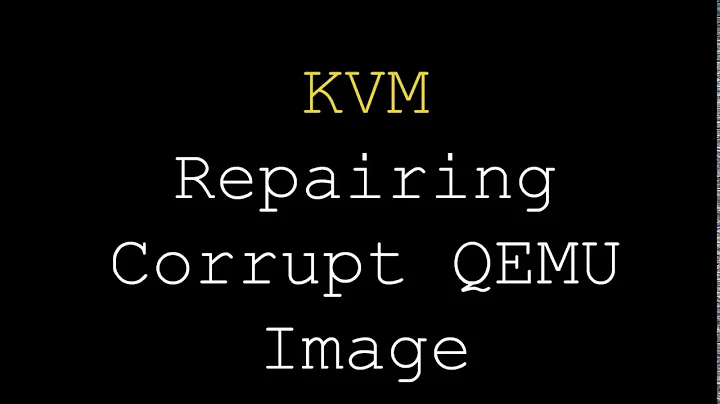Libvirt / QEmu Machine Fails and Refuses Restart Because of Memory Allocation Errors
Based on the error message you pasted, you don't have enough free memory, though -- something's trying to allocate 3221225472 bytes (3.2GB or so), and free(1) is saying you've got at MOST (if you use no buffers or cache) about 1.3GB of available memory.
It looks like you're running without swap. That certainly won't be helping your memory allocation problems. If you normally run with swap (which I'd consider a very good idea on a virtualisation server), then something's gone a bit wrong, and you'll want to fix that.
The other possibility is that you've configured things to run with hugepages, and now that the system's been running for a while you don't have enough unfragmented memory to allocate all the hugepages your VM wants.
Related videos on Youtube
Elmar Weber
Updated on September 18, 2022Comments
-
Elmar Weber almost 2 years
I'm having a problem with libvirt. On a system restart all virtual machines (VMs) are started without a problem and keep running. Then at some point in time a set of machines shuts down according to their log. When I try to restart the machine, I'm getting an error that the memory allocation failed, although more than enough memory is free.
server ~ # free total used free shared buffers cached Mem: 16176648 16025476 151172 0 285432 950300 -/+ buffers/cache: 14789744 1386904 Swap: 0 0 0 server ~ # virsh start zimbra error: Failed to start domain zimbra error: Unable to read from monitor: Connection reset by peer server ~ # tail -n 4 /var/log/libvirt/qemu/zimbra.log LC_ALL=C PATH=/usr/local/sbin:/usr/local/bin:/usr/bin:/usr/sbin:/sbin:/bin QEMU_AUDIO_DRV=none /usr/bin/kvm -S -M pc-0.12 -enable-kvm -m 3072 -smp 2,sockets=2,cores=1,threads=1 -name zimbra -uuid d05ddb7a-83c4-a77b-d8bc-a322648520cf -nodefconfig -nodefaults -chardev socket,id=charmonitor,path=/var/lib/libvirt/qemu/zimbra.monitor,server,nowait -mon chardev=charmonitor,id=monitor,mode=control -rtc base=utc -no-shutdown -drive file=/var/lib/libvirt/images/zimbra.img,if=none,id=drive-ide0-0-0,format=raw -device ide-drive,bus=ide.0,unit=0,drive=drive-ide0-0-0,id=ide0-0-0,bootindex=1 -netdev tap,fd=19,id=hostnet0 -device rtl8139,netdev=hostnet0,id=net0,mac=52:54:00:21:a9:ad,bus=pci.0,addr=0x3 -chardev pty,id=charserial0 -device isa-serial,chardev=charserial0,id=serial0 -usb -vnc 192.168.1.2:25 -k de -vga cirrus -device virtio-balloon-pci,id=balloon0,bus=pci.0,addr=0x4 char device redirected to /dev/pts/2 Failed to allocate 3221225472 B: Cannot allocate memory 2012-07-06 08:42:56.076+0000: shutting down server ~ # uname -a Linux server 3.2.0-26-generic #41-Ubuntu SMP Thu Jun 14 17:49:24 UTC 2012 x86_64 x86_64 x86_64 GNU/LinuxThe system is a Ubuntu 12.04 server. The problem seems to occurs since the last restart, which was due to a number of package upgrades and a kernel upgrade. I tried booting with the previous kernel, the problem persists. The machines fail one after another. The buffers used by the kernel is always increasing. What I'm not sure of is whether this is the cause of the crash or is just a reaction to the available free space.


Any suggestions on how to debug this?
Addendum:
Best regards, elm
-
Elmar Weber almost 12 yearsI thought the buffers part of 'free' is only cached data, i.e. available when needed. Because when I take a look at 'top' and the memory usage of the top processes, at most 2 GB are used.
-
 womble almost 12 yearsYes, but you've only got about 280MB of buffers and 950MB of cache, which isn't anywhere near enough to be able to accomodate an extra 3.2GB of allocation.
womble almost 12 yearsYes, but you've only got about 280MB of buffers and 950MB of cache, which isn't anywhere near enough to be able to accomodate an extra 3.2GB of allocation. -
Elmar Weber almost 12 yearsI added the munin graphs of the memory around the time of the crashes, maybe this helps. I'm unsure whether the space used for buffers is the cause of the crash or just happens because more memory is free.
-
 womble almost 12 yearsOooooh... I see what you're misunderstanding. That second line in the output of
womble almost 12 yearsOooooh... I see what you're misunderstanding. That second line in the output offreeisn't "buffers/cache used" and "buffers/cache free", it's "the amount of memory used/free once buffers and cache are considered free memory". The-/+at the beginning of the line is a (subtle) hint in that direction. You can learn more at linuxatemyram.com -
 womble almost 12 yearsBased on those graphs, I'm going to re-emphasise your lack of swap space, and highly recommend you fix that.
womble almost 12 yearsBased on those graphs, I'm going to re-emphasise your lack of swap space, and highly recommend you fix that. -
Elmar Weber almost 12 yearsThanks, I'll try it with swap space. What I still do not understand is where the 13G of used buffers are, i.e. who is using them for what. There is no application that uses the memory and kernel disk cache should be freed on demand.
-
 womble almost 12 yearsYOU DON'T HAVE 13GB OF USED BUFFERS. You have 285MB of used buffers.
womble almost 12 yearsYOU DON'T HAVE 13GB OF USED BUFFERS. You have 285MB of used buffers. -
Elmar Weber almost 12 yearsYes, I got that, I misformulated the question. I did not mean buffers, I meant the space used by the kernel, showing in the graphs as slab_cache. That space does not show up in top or ps as memory used by a process, so I assume it is used by the kernel as a cache / buffer for some kind of thing? I'm currently trying to get behind the question why it is not freed.
-
Elmar Weber almost 12 yearsI tried it with swap space, the problem is then just prolonged. Today it happened again.
-
 womble almost 12 yearsOh well, time to buy more memory or run less VMs.
womble almost 12 yearsOh well, time to buy more memory or run less VMs.




